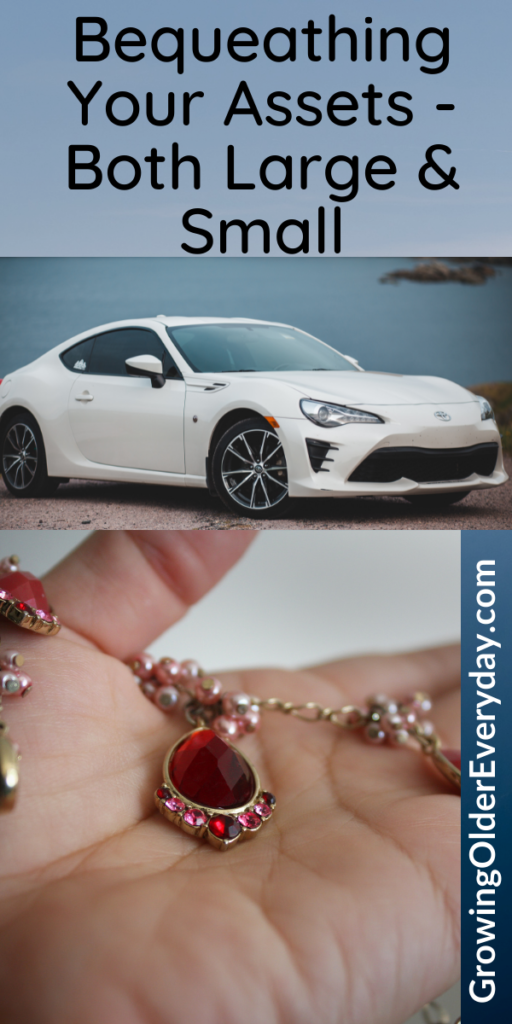
When my grandmother in Minnesota passed away, I didn’t realize that she had marked a small cream and sugar set for me. It was my inheritance from her. Her daughters had been told to give these items to the name on the bottom, in the event of her death. This was the first time someone had set something aside for me to be delivered after they died. I attended her funeral, not realizing that she had marked that for me. In fact, most of the items in her home had been given a label so that, when she died, the item would go to the person she felt would appreciate it the most. I don’t remember it, however, my grandmother remembered me mentioning that I really like that set. So it became mine.
Can you imagine going through everything in your home and putting a post-it-note on each item so that everyone gets something? That would take a lot of time and would it hold up in court if someone protested? Possibly not. However, if it is part of your signed, notarized will, a person trying to challenge your desire would fail.
What do you own that you want to give to a specific person? Maybe your antiques, your china, your mink coat, or the contents of your safe deposit box? Who about your collection of bells, spoons, or Precious Moments? Telling someone they will receive an item is not enough. Everything you bequeath should be done through your will.
In my will, it has a page called “Personal Property Memorandum.” There is a column for the description of the tangible personal property and one for the person who will receive that property, including the address and relationship. My husband has a list and there is one for me. If the property cannot be distributed until our spouse dies, then it needs to be marked with an asterisk.
Is bequeathing your assets necessary?
Is bequeathing your assets necessary? That depends on your relationship with your survivors and I would say their relationship with each other. If you know your son really wants your china, it should be listed or after your death, his sister may say she wants it. So this will depend on what assets you are leaving behind. You might want to ask your children prior to your death if there is anything they would like to have passed down to them.
If you have a friend or family member not mentioned in your will that has mentioned they would like a particular item, you need to add that to the list. Promising something to a person who is not a beneficiary of the will may mean they won’t receive the item if your beneficiaries disagree.
Typically, most of your assets will go to your heirs (beneficiaries.) Usually, it is split evenly, but in some circumstances, it may not be. If it is split equally your heirs need to determine what happens to all the stuff left in the house, garage, storage unit, and safe deposit box.
Who is eligible to receive a bequest?
Anyone you know is eligible to receive a gift by bequest. Even a business could be eligible. There is no requirement that the recipients be related to you. It’s yours to do what you want with it.
You might give a sizeable amount of money to cancer research if you are a cancer survivor. Or, if your children are all wealthy or you are childless, give all the money to charity. If you have one and only one sibling, you could give everything to him/her.
What might you bequeath?
Most likely you will not be bequeathing your silverware unless of course it is sterling silver and was passed down from previous generations. An antique car could be something you bequeath, but it is unlikely you will single out your 1972 Toyota truck. Jewelry that is of great value or has sentimental value could be items you should list as bequeathed. An art collection could be bequeathed to a local museum or library or a family member.
If you own multiple houses, like rentals, vacation homes, etc. be sure to discuss them with your children before you die. If your children have an interest in some of them, they might want to have them appraised at the time of death and split up evenly (if possible.) Or all sold and the money split evenly.
Even cash can be bequeathed. Say you have a handicapped child that will have extra expenses. That child could receive more cash than the others, to help pay for ongoing expenses. Or you may designate a percent or flat amount of your estate to your favorite charities.
What if you don’t bequeath something?
Obviously, if you have only one child, bequeathing might be unnecessary. However, if you want grandchildren or friends to receive something, it should be stated so that those people end up receiving that item. Do not expect that your children will remember that your grandson that collects stamps will receive your collection. Or that your friend Sue gets your Precious Moments collection. There is so much to do after a parent dies, your children could forget things along the way if it has not been written as part of your will.
If you have several children, do everything you can ahead of time to prevent squabbles among them. After a parent dies, the children are already in mourning. The last thing you would want would be for them to be fighting over that mink stole their father bought for you. Or the collection of Nativities that you inherited from your mother.
Discuss your will with your children, or at least your executor(s)
It is best to go over your will with your children to avoid any hurt feelings or misunderstandings. This is especially important if someone owes the estate money that was loaned to them. Also, if you are giving something to charity (art collection, jewelry, etc.) that your children might have wanted. If possible, have letters explaining why you gave something to someone. Maybe you are giving your delft dishes to your neighbor because she has a matching set and always wanted to buy yours.
Be sure that your executor knows what items you are referring to. This is especially important if the executor is someone other than your beneficiaries.
Discuss your high-ticket items with your children. It is better to settle any disagreements now before you die so that your children can resolve any issues the way you would choose. And don’t forget to make plans for any pets you have. They will need a loving home.
When you die
Most of us are not in a hurry to die. But when you do, it would be nice to make your intentions as clear as possible. Bequests are an easy way to make things clear for everyone.
Have you considered bequeathing any of your assets? I appreciate your comments below. Thank you.

